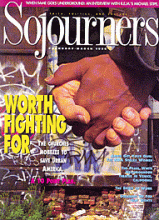FEASTING IS JUST half the story. To have "Sunday dinner" implies plainer weekday meals. Holiday banquets include foods not seen the rest of the year. Feasting cannot truly be feasting if there is no contrast, no type of restraint on ordinary days to keep our bodies and our spirits in balance. The other side of feasting is fasting.
By fasting I mean both the year-round practice of eating simply, to remember and in some small way to mitigate others' hunger, and also the occasional (or regular) discipline of going without food entirely for a period of time - for one day a week or month, for Holy Week, or for clarification or purification before a significant event.
Our culture does not take self-denial, discomfort, or the discipline of fasting very seriously. Feeling hungry is for dieters, political or religious fanatics, or the poor. What were treasured gifts on special days for our forebears - meat, sweets, wine - have become daily fare for us. We want to eat what tastes good, what we like, what will keep the kids quiet. If we can afford it, why not? Subconsciously we have begun to think we are entitled to three meals a day, making it hard to feel gratitude for food or to consider giving up any portion of it.
I find fasting uncomfortable to think about because I love to cook, like to eat, and crave the camaraderie that happens around a full table. Fasting would seem to deny me all this. When fellow Sojourners Joyce Hollyday and Jim Wallis fasted 40 days during the Persian Gulf war in 1991, the sight of them walking in the door each morning with their water Thermoses and juice bottles was enough to send me straight to the office kitchen for toast.
Read the Full Article
